We all first enter the world of health and fitness with a distinct purpose in mind. For some, it's a desire to improve physical performance in a competitive sport; yet others may decide that they'd like to just look and feel better. But what happens after all of these goals are reached highlights the beauty of fitness - new goals are set, as there's always something to work on in terms of your overall health and wellness!
Being aware of all of the variables that are at play is important in any area of health and wellness, especially when it comes to dialing in nutrition. Proper ratios of macronutrients are often the focus of any solid nutritional plan, but you can take things up a notch by paying attention to the micronutrients consumed as well.
Micronutrients, a term used for the various vitamins and minerals contained in foods and supplements, are an incredibly important variable in terms of health despite their diminutive reputation. They help facilitate a more efficient body, in turn allowing us to pursue whatever our goals may be at a higher level. Whether you're looking to lose fat or add muscle, build up a better aerobic capacity or increase strength, adequate amounts of micronutrients can prime your body for the task at hand!
Chromium: A Mineral That Optimizes Your Metabolism
It's important to note that different micronutrients have different things to offer, and understanding just what they are is crucial. One such micronutrient that doesn't get nearly enough shine for what it does is chromium. A trace mineral that's integral in optimizing one's health, specifically when it comes to nutrient metabolization and insulin secretion.
No matter where your fitness goals lie, make no mistake about it - a healthy metabolism is a massive piece of the puzzle, and chromium may be able to help you complete the picture.
Before we take the deep dive into chromium, make sure you're subscribed to PricePlow - we help you find some of the best deals on supplements out there and deliver the latest industry news on your favorite brands!
Chromium Picolinate – Deals and Price Drop Alerts
Get Price Alerts
No spam, no scams.
Disclosure: PricePlow relies on pricing from stores with which we have a business relationship. We work hard to keep pricing current, but you may find a better offer.
Posts are sponsored in part by the retailers and/or brands listed on this page.
Learn about Chromium Picolinate in One Minute
What exactly is chromium?
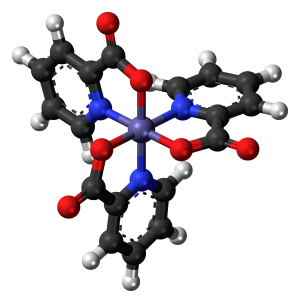
Regardless of what you think of this fat burner, you gotta agree that chromium has some of the coolest-looking 3D molecules. Image courtesy Wikimedia
Chromium is a trace mineral that's been around forever, inhabiting the earth's crust and ingratiating itself into the various plants that grow from it, as well as the animals that feast on such plants. According to the National Institutes of Health, the foods that boast the highest levels of chromium are broccoli, wheat, grapes, and meat,[1] with broccoli supplying a relatively large 11mcg per serving.[1]
That might not sound like much, but humans don't need a ton of this mineral in order to put it to work. Healthy adults generally need somewhere between 20mcg to 35mcg per day, depending on age and gender.[1,2] And even though chromium is present in several foods, many of us still fail to hit this range!
Trivalent Chromium vs. Hexavalent Chromium
It's important to delineate between the two versions of chromium found in the world. Trivalent chromium, or chromium that has the ability to form bonds with up to three other atoms, is the version we're focused on - it's the type found in food that's biologically active![1]
Hexavalent chromium is the other form that exists, however this form is quite different from the former. Hexavalent chromium is highly toxic,[3,4] and is often only discussed in conversations regarding products of pollution via industrial production. Thankfully, in an effort to avoid its negative health impacts, the EPA is currently working on minimizing our exposure to this compound.[4]
For the sake of brevity, when we say "chromium", rest assured that we're talking specifically about trivalent chromium -- this is the variety that can do a whole bunch of good within the body!
Chromium deficiency gives clues to its benefits

You can consider insulin resistance to mean "sugar saturation" - at some point, overfilled adipocytes refuse to store more energy. Waist-to-Height ratio makes for an excellent proxy to insulin resistance. Image courtesy Dr. Ted Naiman.
Lower in this article, we discuss chromium deficiency in greater detail, but the main issue when one is deficient is severe insulin resistance.[5] Insulin resistance is better known as "energy toxicity" (we also sometimes refer to it as "sugar saturation"), and is a state where the body's cells are no longer willing to accept more input energy.
This leads to a toxic environment, and is implicated in a vast multitude of diseases including obesity, diabetes, hypertension, kidney failure, liver disease, PCOS, sleep apnea, cancer, and cardiovascular disease.[6] Chromium deficiency is exacerbated by a high sugar diet,[7] and chronic stress / low-exercise states,[8] all of which lead to excessive chromium excretion, further amplifying the issue.
With knowledge that chromium deficiency can lead to (or worsen) insulin resistance, much of the research on supplemental chromium revolves around this mechanism and its effects on insulin, blood sugar, diabetes, and related conditions.
Main interaction - insulin secretion!
After touching on chromium deficiency, let's get into why the mineral, in appropriate amounts, is so important!
Upon absorption, chromium moves into the body and is met with chromodulin, an oligopeptide produced within the liver that bonds to chromium exceptionally well.[9,10] In fact, it interacts so well with chromium that there seems to be no other minerals that can stimulate similar levels of activity.[11] This is an incredibly important point given the responsibilities that chromodulin takes on within the body.
Chromodulin and insulin's relationship
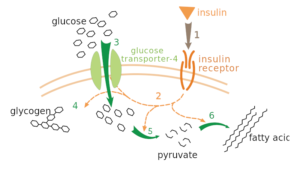
1: Insulin binds to its receptor, 2: activating various protein cascades, including translocation of GLUT4 transporter to the plasma membrane. 3: The influx of glucose. 4: The synthesis of glycogen. 5: Glycolysis. 6: Triglyceride synthesis. Image courtesy Wikimedia.
Research shows that chromodulin stimulates the insulin receptor, effectively improving the insulin signaling mechanisms within the body.[12] This receptor, when activated, helps the body efficiently uptake glucose into cells and regulate blood sugar. However, it relies on the excretion of insulin in order to do so.
Chromodulin mimics the presence of insulin to some degree, binding first with chromium, then with subunits of the insulin receptor to activate it.[12] This interaction doesn't just approximate the presence of insulin, but also amplifies it - research suggests that chromodulin works in conjunction with insulin to increase insulin signaling by upwards of 8 times baseline activity![13]
In other words, chromium bonds with chromodulin to enhance insulin sensitivity, which can have a huge effect on your body's glucose levels, among other things.
Chromium, alongside chromodulin, also stimulates AMPK
That's not all this duo seems to do within the body, however!
Interacting with a pathway commonly associated with insulin, chromodulin bonded with chromium also upregulates AMPK activity in muscle cells.[14] AMPK, also known as adenosine monophosphate kinase, is integral in regulating energy homeostasis - when activated, it helps metabolize fatty acids and stored glucose for energy,[15] effectively regulating body weight. It also assists in the quest of building lean muscle, as it puts the body in an anabolic state.[16]
The importance of either of these mechanisms simply cannot be understated. Insulin signaling is directly tied to important areas of health such as insulin sensitivity and blood sugar levels, while AMPK plays significant roles in things like energy balance and insulin response. Both of these pathways are central in maintaining a healthy body weight, thus, it shouldn't come as a surprise that most of the applications of proper chromium supplementation are focused not only on insulin response, but weight management too!
Chromium picolinate to the rescue!
For optimal chromium supplementation, look no further than chromium picolinate!
Chromium picolinate consists of trivalent chromium bonded to three picolinic acid molecules.[16] This variant of chromium is a stable, highly bioavailable form of the mineral.[16] Given existing research, it's the preferred form of chromium for supplementation. It's also the form used to test different theories and hypotheses focused on chromium, making it easy to relate research to the specific ingredient itself.
With the mechanisms behind chromium, the functions it affects, and its supplemental form all covered, one incredibly important question remains - what can chromium picolinate supplementation potentially do?
Benefits of chromium picolinate
As expected, a lot of the potential uses of chromium picolinate are associated with the main pathways it interacts with once it's at work within the body. However, there seems to be even more benefits in other areas as well.
-
Improved insulin sensitivity and blood glucose levels...in specific people!
Arguably the most studied application of chromium picolinate supplementation is its effects on insulin sensitivity. Obviously, given the understanding of how the compound reacts with chromodulin once ingested, the grounds seems fertile for some blood sugar improvement.
However, does science back up such expectations? Yes, but it seems to depend on the individual. Results are most promising in those with diagnosed issues involving insulin, such as diabetes.
In a review paper from 2014, researchers from Thailand assessed 25 studies in which chromium or chromium picolinate were used in attempts to treat individuals with diabetes. They found that, overall, chromium supplementation significantly improved blood glucose levels, likely through an effect on the insulin receptor.[19]
Moreover, this meta-analysis found the most pronounced results in studies that used chromium picolinate,[19] supporting its status of the preferred supplemental variant of this essential mineral. In another study from 2006, researchers saw a daily dose of 200mcg of chromium significantly decreased fasting blood glucose and insulin, in addition to improvements in insulin resistance, in subjects with type 2 diabetes. However, similar results were difficult to come by for those who did not have diabetes.
Chromium and nondiabetic subjects
One study from 2009 implemented a double-blind, placebo-controlled analysis. Using 63 subjects, individuals were assigned to one of two groups - one received chromium picolinate at a dosage of 1000mcg per day, while the other received a placebo.
In comparing the two groups after 16 weeks, they found that while chromium did facilitate acute insulin response, it failed to initiate any lasting changes between groups.[20] In other words, it worked in the short-term, but its effects didn't leave any lasting impact on the individual!
This notion actually supports earlier research that reached similar conclusions - in 2002, researchers found that in 425 nondiabetics, chromium supplementation had no effect on glucose or insulin levels.[21]
The central variable in regards to the effectiveness in chromium as an insulin sensitivity-booster seems to be the state in which one's insulin sensitivity currently lies. In those with diabetes, whose cells respond extremely poor to insulin activity, chromium supplementation seems to provide substantial aid. Alternatively, in individuals whose levels of insulin resistance fail to reach such dire straits, the ingredient doesn't have too much to offer in this regard.
This lack of a widespread response is somewhat disappointing for nondiabetics in search of help in the realm of body weight, but fear not - chromium has more to offer in another weight-related area!
-
Suppresses appetite and cravings
In a study from 2008, researchers used a double-blind, placebo-controlled experiment to test the effects of daily chromium picolinate supplementation in healthy, overweight women. For eight weeks, half of the subjects were given 1000mcg of the mineral daily, while the other received a placebo. In an effort to uphold consistency across groups, daily caloric intake was also monitored.
Studies show that Chromax is effective at reducing appetite, which helps promote weight loss. Image courtesy of Nutrition21.
At the end of the study, they saw that those in the chromium picolinate group showed signs of reduced food intake, hunger levels, and dietary fat cravings.[22] Additionally, these results also correlated to a tendency of decreased body weight in the test group, compared to placebo.[22]
Another study used similar methods to test the effectiveness of this ingredient, but did so with 113 adults diagnosed with atypical depression. The focus of this study was to assess how well the ingredient could subdue carbohydrate cravings, as well as the degree of depression, after eight weeks of treatment.[23]
Those assigned to the chromium picolinate group received a daily dose of 600mcg and the others received a placebo. They found that while both groups showed improvement in symptoms of depression, the chromium subjects saw significant improvements in appetite, consumption, and carbohydrate cravings than placebo.[23]
Though the results behind insulin sensitivity are mixed, there seems to be a consensus here - chromium picolinate is capable of keeping cravings and hunger at bay. Research suggests this is a product of neurotransmitter stimulation, which helps keep you mentally healthy and more aware of your dietary decisions!
-
But what about weight loss?!
Now, we have two related focuses that have contradicting results - chromium picolinate seems to help ward off cravings and suppress hunger, but does not produce the insulin sensitivity improvements a non-diabetic would hope for. As both of these areas are integral in weight management, we need to dive into more research directly testing chromium picolinate on body weight to see which side of the equation it falls on!
Chromium has been shown to significantly improve body composition.[24] Image courtesy of Nutrition21.
A landmark study from 1996 recruited 154 participants and divided them up into three groups.[24] The subjects receive either a placebo, 200mcg chromium picolinate, or 400mcg chromium picolinate per day.[24] The researchers used a randomized, double-blind, placebo-controlled study design to ensure the most accurate results, they also let the participants go about their normal lives with no exercise guidelines or dietary restrictions.[24]At the end of the study participants that supplemented with 200mcg or 400mcg significantly improved their body composition based on an underwater weighing compared to the placebo.[24] There were no significant differences between the 200mcg or 400mcg group, suggesting that a wide range of dosages can yield results.[24]As a follow-up, the same leading researcher of the 1996 study performed a similar experiment two years later, but controlled the participants caloric intake and expenditure.[25] This time, 122 participants received either 400mcg of chromium picolinate or placebo. The subjects' body fat was assessed using a DEXA scan (dual energy x-ray absorptiometry).[25]
Even after controlling for the subjects' caloric intake and expenditure, once again, the group supplementing with 400mcg of chromium picolinate per day saw a significantly greater reduction in fat, weight, and body fat percentage compared to the placebo.[25]
Mixed results...
So far, we have two studies showing great results with chromium supplementation in regards to body fat and weight loss, however more recently, some studies have come out with mixed results on how effective it really is.
One meta-analysis from 2013 found that in 13 studies focused on individuals with type II diabetes, no significant differences in body weight were attributed to chromium picolinate supplementation.[26]
With better insulin sensitivity, you'll have more energy to do the things you enjoy. Image courtesy Nutrition21.
Yet, in that same year, another meta-study published reached contradictory results. Looking at a total of nine studies (and 622 participants), these researchers found a significant difference in body weight after 12 to 16 weeks of supplementation.[27] However, they noted that the data used in their analysis was somewhat unreliable, and ultimately concluded that there wasn't any reliable evidence to support chromium picolinate in aiding weight loss.
Due to these mixed results, we would like to see more studies done on chromium picolinate supplementation before making any claims. But given the underlying effects it has on insulin sensitivity and appetite suppression, it certainly makes sense that there would be some positive link with weight loss, although we still suggest diabetics undertake glycemic-friendly, calorie-controlled diets.
Not all is lost, however!
That being said, there does seem to be an application for chromium picolinate for individuals embarking on a weight loss endeavor.
Because reducing cravings and blunting hunger are both key parts of any diet, having something in your arsenal to help you do those two things can be beneficial. In terms of weight management, then, chromium picolinate does have a place - it'll offer aid to some degree, but it certainly won't do all the easy work for you!
-
Other potential applications
-
Heart health
There's also been research focused on chromium and potential applications in upholding cardiovascular health. In a study from 2005, researchers found a significant relationship between chromium concentrations within the body and heart disease - those with lower chromium stores were at higher risk of developing heart disease.[28]
Compared to other popular weight loss ingredients, Chromax outperforms them all![25,29-32] Image courtesy Nutrition21.
Similarly, a double-blind, placebo-controlled analysis saw that chromium picolinate supplementation reduced QTc intervals in type 2 diabetics.[33] QTc is a metric measured during an electrocardiogram (ECG) that conveys the time it takes for the heart to contract and relax, with higher QTc intervals being linked to cardiac disease in research.[34] By inhibiting QTc interval elongation, chromium picolinate seems capable of fighting against an important indicator of heart issues.
Synergy with Grape Seed Extract for heart health!
It's also worth noting a synergistic relationship that exists here, as well. Grape seed extract (GSE) is a popular antioxidant whose large concentrations of procyanidins are often leveraged for heart health benefits.
A study from 2000 found that supplementing with both GSE and chromium reduced total cholesterol, though this result was heavily credited towards GSE.[35] Interestingly, however, these effects were not seen in independent treatment, but only when the two were used together![35]
-
Neurologic benefits (serotonin)
The neurological interactions of chromium are where the potential for appetite suppression seems to come from, with further investigation revealing the underlying mechanisms that may explain how the mineral works inside the brain!
At a high enough dose, Chromium Picolinate may also provide some cognitive benefits! Image courtesy of Nutrition21.
Neurotransmitters are key chemicals released within the brain that essentially help the central nervous system communicate commands throughout the body. These chemicals are responsible for things such as mood, heart rate, mechanical movement, and even sleep patterns!
They're at the center of virtually everything we do, which makes situations of irregular production especially worrisome - sometimes, the body struggles to produce or uptake enough of these substances, leading to unique issues depending on the precise chemical.
For instance, poor production or uptake of serotonin, a derivative of the amino acid tryptophan that is a key regulator of mood and appetite, has been linked to onset depression.[36] While this is just one of many examples of why neurotransmitters are important, it also leads us to a potential application of chromium supplementation - increases in serotonin production!
Chromium boosts serotonin production!
Research seems to have uncovered how this mineral affects serotonin levels, with results conveying that it's a byproduct of the mineral's more renowned use! A study from 1994 suggests that chromium increases insulin sensitivity within the hypothalamus, which in turn upregulates serotonin production.[37]
Furthermore, additional research has identified a positive correlation between serotonin levels and insulin sensitivity in healthy individuals, essentially concluding that those with better insulin responses tended to have higher serotonin activity,[38] and vice-versa. This relationship perhaps explains just how chromium goes to work within the body - by upregulating serotonin, the mineral in turn increases insulin sensitivity!
-
Serotonin and insulin sensitivity
Testing these effects in vivo, a study from 2003 treated mice with chromium picolinate through two different methods - acute injection of 20mg or 50mg of the compound or a two week diet consisting of a daily dose of 100mg per kg of body weight. They found that the injections acutely raised brain serotonin levels in a dose-dependent manner,[39] while the diet experiment saw a 38.5% increase in brain serotonin levels.[39]
This study showed that chromium was effective at reducing body fat and maintaining lean muscle mass.[25] Image courtesy of Nutrition21.
Carrying these results over to human studies, however, have not reached similar conclusions - research administering 400mg of chromium picolinate did not affect serotonin levels in human tests,[40] though they did see a slight mediation of cortisol increases, suggesting a potential effect on regulating stress.
Though there isn't much human research out there, we remain somewhat optimistic about the abilities of chromium picolinate supplementation in regards to serotonin production. The mechanisms at play encourage such optimism - increases in insulin sensitivity and its link to serotonin, appetite attenuation, and the direct results seen in mice models.Additionally, the ingredient has shown promise in human studies with test subjects diagnosed with depression - a condition often linked to brain chemical imbalances whose treatments often incorporate means to increase serotonin levels. The pieces are there, and we look forward to seeing more human research that can hopefully unveil the full picture!
Now that you know the benefits of chromium, let's assess how much you should be taking and what to look for in a supplement.
-
Chromium absorption - balance is key!
Once ingested, chromium makes its way into the rest of the body by way of absorption within the intestines.[41] However, there are a few things that researchers have found to be a limiting factor in chromium absorption.
Using a mice model, one study found that ingesting phytate (or phytic acid), a naturally-occurring antioxidant found in foods such as wheat, brown rice, and oats, alongside minerals like chromium can limit absorption.[41]
Other research has suggested that chromium fights with other nutrients for uptake, with zinc being commonly known as the chief competitor.[42] As far as boosting chromium absorption, research has also found that amino acids, vitamin C, and vitamin B all help the body absorb more of this trace mineral.[43]
Despite these mechanisms of either inhibiting or encouraging chromium absorption, the body may be capable of regulating such uptake, to a degree, independently! Due to its existence as an essential mineral, one would expect that the body is quick to absorb as much chromium as it can get. This notion is actually false, as research from 1985 found that chromium absorption is inversely correlated with intake - meaning the more chromium available, the less of a percentage the body actually intakes.[44]
Chromium deficiency
While there are risks to having too much chromium in the body, there are also issues when you're deficient in it.
Chromium deficiency is often linked to individuals with severe insulin resistance,[5] with additional research finding that those consuming a diet high in sugar are at risk of chromium deficiency due to elevated chromium excretion.[7] Other life circumstances, such as little exercise, pregnancy, and chronic stress, are also known to increase chromium excretion.[8]
Although chromium deficiency is extremely rare in humans, there's a bit of a "chicken-or-the-egg" situation with the effects of low chromium levels and what causes them. Due to the main mechanisms it drives, it's difficult to pinpoint whether low chromium levels cause such complications, or if the complications themselves lead to lower levels of the mineral.
Safety and dosage
As we mentioned earlier, there are some toxicity issues to be aware of when consuming chromium. Firstly, the compound does produce the hydroxyl radical as a byproduct of its metabolism,[16] however this isn't a major concern in most cases.

If you want to perform at your best, then proper nutrition must be a priority. Image courtesy of Nutrition 21.
Secondly, and more importantly, research suggests adverse effects are possible at extremely high doses. Even though there's no real consensus about where this upper threshold lies, research has shown that dosages upwards of 100mcg per pound of body weight could negatively affect the liver.[45]
Additionally, a study administering daily dosages between 1200 mcg and 2400mcg of chromium picolinate to women had subjects who reported serious kidney issues,[46] providing further evidence that there's a balance to be struck with chromium supplementation. It's important to not that these adverse effects aren't common by any means, but they're something you should be aware of nonetheless.[47]
Adequate intake of chromium
Unfortunately, there is yet to be an established daily dosage of chromium. However, in 2001, the Food and Nutrition Board at the Institute of Medicine published "adequate intake" (AI) for multiple vitamins and minerals, including chromium.[47]
This AI isn't necessarily a "recommendation", however it does estimate how much humans tend to get from regular diets, and assumes its adequacy. The AI differs between age and gender,[1,2,47] but here's a quick snippet - men between the ages of 19 to 50 have an AI of 35mcg, whereas women in the same age range have an AI of 24mcg.[1,2,47]
These AIs are by no means a daily dosage recommendation, nor can they be extrapolated to derive any upper threshold. Science has yet to determine such metrics, but we'll be sure to keep our eyes out for when these numbers become available.
Recommended dosage based on the literature
In the meantime, our best guess is simply to use chromium picolinate supplementation responsibly. If you're interested in utilizing the supplement, we'd suggest following the dosages used in studies that show positive results. For most, this seems to be somewhere between 100mcg to 1000mcg per day - not a perfect range, sure, but that's the best we can offer at this time!
The current body of literature suggests that the higher the dose the more health benefits you may notice up until a certain point. Dosages of 200-400mcg seem to improve cardiovascular health, body composition, glucose metabolism, and aid body fat reduction.
Dosages of 600mcg yield all of the benefits we just listed, plus reduce cravings and enhance mood. Lastly, dosages of 1000mcg may also result in a cognitive boost.
Before supplementing with any chromium, we highly recommend speaking with a qualified healthcare professional first to determine what's the appropriate dose for you.
Interested in chromium picolinate? Check out ChromaxⓇ from Nutrition21!

Nutrition21 is a leader in the industry and takes huge steps towards making supplements safer, more effective, and transparent!
Nutrition21 is one of the premier ingredient developers in the industry, an earned status they've held for quite some time. You've likely heard of them before, as they've put out some of our favorite supplement ingredients on the market, but ChromaxⓇ may just be the most popular among all of them.
This patented, high-quality form of chromium picolinate has been in our industry for years, utilized across a wide array of products to deliver the benefits we've discussed above.
From multi-vitamins, to fat-burners, and nootropics, Nutrition21 has been able to inject their incredible variant of chromium into various supplements. We're always happy to see it pop up in another product, because nothing beats getting an integral ingredient from a standard-setting, influential, science-backed ingredient formulator like Nutrition21!
Chromax: Not all chromium is created equal
When it comes to seeing the most benefits, you want to get the ingredient with the highest bioavailability. Two studies have shown that Chromax is up to 15 times more bioavailable than other forms of chromium on the market.[48,49]
We talk about the importance of proper absorption and bioavailability all the time on the PricePlow blog, because it's crucial for optimal results. Wasting your money on supplements that just pass right through you is far from ideal and that's why going with trademarked ingredients shown to have superior absorption is what you want to look for.
Chromax comparison
There are several ingredients on the market that may be able to facilitate a greater amount of fat loss, however Chromax may be the best of them all...
If you compare Chromax to other popular weight loss ingredients, such as green tea, fiber, garcinia cambogia, and irvingia gabonensis, it significantly outperforms them, meaning it results in more fat loss than any of the compounds we just listed.[25,29-32]
Furthermore, when Chromax is compared to popular diet programs, including high protein/low carb, high protein/low fat, very low calorie, and even high fiber, Chromax supplementation results in the greatest reduction in body fat percentage and the smallest reduction in lean body mass, which is exactly what you should be aiming for.[25,29-32] The goal should always be to keep the muscle, but ditch the fat!
Check out this video to learn more about Chromax from Nutrition21
Conclusion: Consider adding chromium picolinate to your regimen!
The body's ability to secrete insulin and have the cells respond accordingly is crucial for shuttling nutrients to where the body needs them, building muscle, and maintaining metabolic functioning. It even seems to have an effect on our neurotransmitter production, as well. These relationships carry outwards, affecting our ability to avoid cravings, manage hunger, and our mood, among other things. In doing the things that allow the body to keep blood glucose in check, we can help set ourselves up for success in various ways.

Nutrition21 is here to fuel your toughest workouts with premier ingredients! Image courtesy Nutrition21.
One way to do so is through supplementation, specifically that of chromium picolinate. Though research shows significant insulin sensitivity improvements in specific populations, the consensus around the nutrient's ability to enhance neurotransmitter production and in turn, suppress appetite and improve mood, is impressive. Even yet, the science behind how chromium operates within the body, working with chromodulin, shows promise for some potential positive effects on the insulin receptor, which could lead to better insulin sensitivity.
Regardless, the evidence supporting chromium picolinate for use in areas concerned with insulin sensitivity is there. Specifically, those looking to maintain a healthy weight or even achieve a healthy weight may find benefit in curbing their appetite or subduing the occasional craving. Furthermore, chromium picolinate can help upregulate neurotransmitter production, which enhances not only our mood, but also the ability to keep our nutrition and diets on track!
If you want to try it out for yourself, then look no further than Chromax from Nutrition21 for optimal results! We will continue to add information to this post as more research comes out, so make sure to subscribe down below to get notified!
Subscribe to PricePlow's Newsletter and Alerts on These Topics
Chromium Picolinate – Deals and Price Drop Alerts
Get Price Alerts
No spam, no scams.
Disclosure: PricePlow relies on pricing from stores with which we have a business relationship. We work hard to keep pricing current, but you may find a better offer.
Posts are sponsored in part by the retailers and/or brands listed on this page.



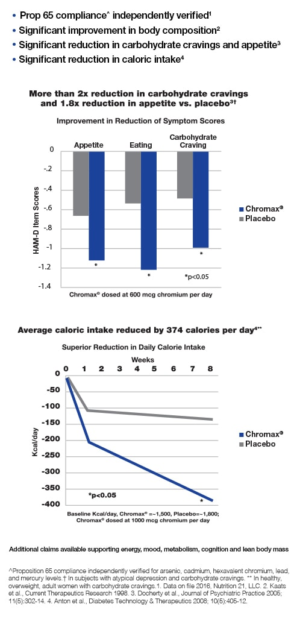
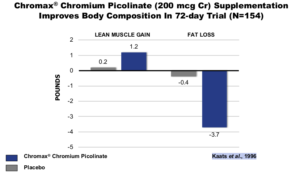

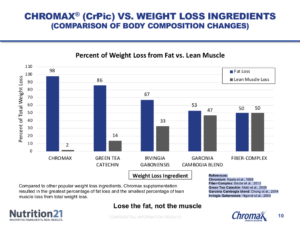

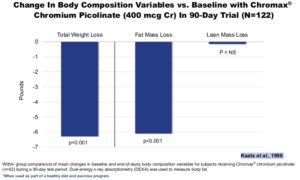
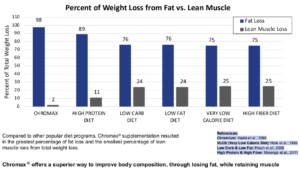
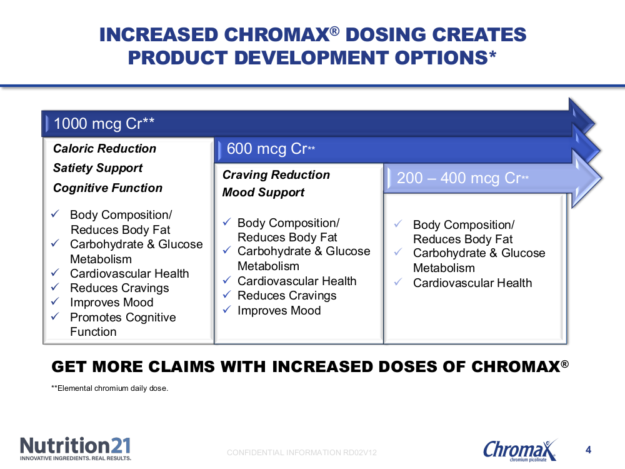
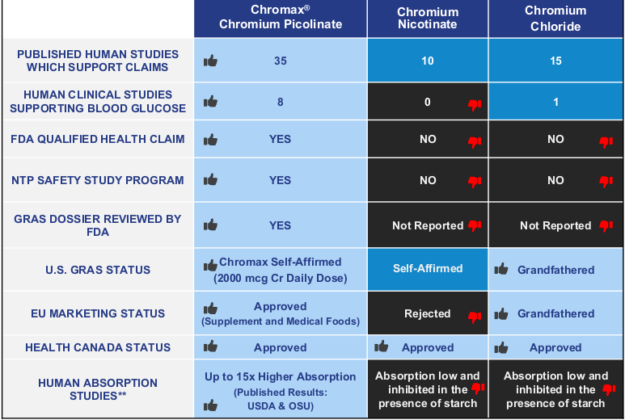


Comments and Discussion (Powered by the PricePlow Forum)